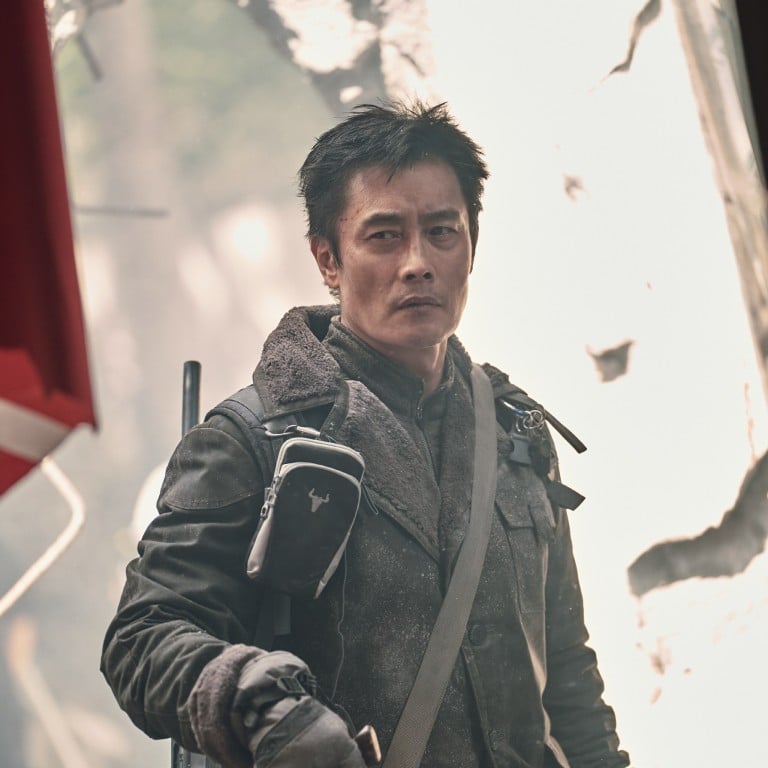
From Concrete Utopia to Train to Busan, 10 must-watch Korean disaster movies to see before you die, ranked from good to great
- Korean disaster movies are capturing audiences around the world, and the genre has been growing since the release of Tidal Wave in 2009
- We pick our top 10 Korean disaster films, from Exit, starring Cho Jung-seok and Im Yoon-ah, to Concrete Utopia and the ultimate zombie classic Train to Busan
The disaster movie has proved a perennially popular film genre, combining large ensemble casts and state-of-the-art special effects to deliver a thrilling ride of eye-popping spectacle and relatable human drama.
From Irwin Allen classics like The Towering Inferno and The Poseidon Adventure to Roland Emmerich’s The Day after Tomorrow and 2012, Hollywood has inevitably led the way, but in recent years, the growing Korean film industry has shown it has the budgetary clout necessary to produce such spectacles.
Certainly, since the success of 2009’s Tidal Wave (also known as Haeundae) Korean studios have enthusiastically exploited the popularity of the disaster movie.
The 10 best films from Korean cinema’s best year – 2003, the year of Oldboy
With the release this week of Um Tae-hwa’s Concrete Utopia, we have selected 10 of the best Korean disaster movies of recent years.
10. Exit (2019)
In Exit, Seoul is smothered by a deadly poisonous gas that threatens to engulf even the tallest of skyscrapers.
Bolstered by an intriguing subtext about South Korea’s brutally competitive job market, the film sees Cho Jung-seok play unemployed thirty-something Yong-nam who, trapped in a banquet hall with his entire family, finally gets to prove his mettle and save the ones he loves.
9. Ashfall (2019)
One of the most bonkers disaster movies to emerge from this era, Ashfall deserves recognition, if only for its writers’ attempt to tick as many blockbuster boxes as possible.
Ha Jung-woo leads a covert military operation into North Korea to steal nuclear weapons that will be used to prevent a cataclysmic volcanic eruption, in a plan conceived by Ma Dong-seok’s government scientist.
8. Tunnel (2016)
Ha Jung-woo is again caught up in a life-or-death race against time, in Kim Seoung-hun’s breathless thriller that owes more than a passing debt to Sylvester Stallone’s Daylight.
7. Tidal Wave (2009)
Touted as “Korea’s first disaster movie” upon release, JK Youn’s hugely ambitious event picture set the tone for the films that would follow.
It is more than an hour into the drama before a monstrous tsunami is spotted off the coast of Busan, giving the stacked cast of A-listers, fronted by Sol Kyung-gu, Ha Ji-won and Park Joong-hoon, precious little warning before they are engulfed in seawater and debris.
In its most memorable sequence, survivors on the city’s giant suspension bridge are pelted by shipping containers cascading from an upended vessel.
6. The Tower (2012)
The Tower is in many ways a spiritual sequel to Tidal Wave, replicating that film’s blend of melodrama, broad comedy, and edge-of-your-seat excitement, albeit in a more vertiginous urban setting.
A knowing riff on Irwin Allen’s 1974 classic, widely considered the high point of the genre, The Tower follows the fortunes of various characters who are trapped in a Seoul skyscraper after a helicopter crashes into it on Christmas Eve.
Sol Kyung-gu once again leads the charge, as the fire captain heading the rescue effort, while Son Ye-jin and Kim Sang-kyung are among those trapped inside.
5. Emergency Declaration (2021)
Loaded with a manifesto of impossibly high-profile stars and a cargo that includes every disaster movie cliché imaginable, it’s surprising that Han Jae-rim’s preposterous thriller gets off the ground.
4. The Terror Live (2013)
Who else but Ha Jung-woo finds himself at the centre of a life-threatening disaster yet again in Kim Byung-woo’s high-concept thriller that also serves as a biting critique of journalistic sensationalism?
Ha plays a disgraced news anchor who now hosts a morning radio show. When a caller claims to be a terrorist and threatens to blow up Seoul’s Mapo Bridge, the shock jock calls his bluff, only for the bridge to suddenly collapse.
What follows is an increasingly breathless game of cat and mouse with the lives of millions hanging in the balance.
3. Birthday (2019)
An outlier in the genre, Lee Jong-un’s heart-wrenching drama chronicles the impact of one of the most traumatising real-life disasters in Korea’s recent history, but does so without showing a single frame of the incident itself.
2. Concrete Utopia (2023)
Director Um Tae-hwa’s sensational social satire uses a devastating earthquake as the trigger for a scabrous takedown of authoritarian rule, xenophobia, and Korea’s aspirational housing crisis.
When a solitary flat complex remains standing following a devastating tremor, survivors from the surrounding area arrive seeking shelter.
1. Train to Busan (2016)
A global box office sensation that unleashed a horde of zombie movies and television shows which continues to this day – as if we needed any more – Train to Busan is one of the best horror movies in recent memory and arguably the best disaster movie to emerge from Korea.
Seen by many to tackle unaddressed grief and trauma following the Sewol ferry disaster just two years earlier, Yeon Sang-ho’s breathless thrill ride also targets Korea’s outdated hierarchical structures within a rip-roaring adventure.

